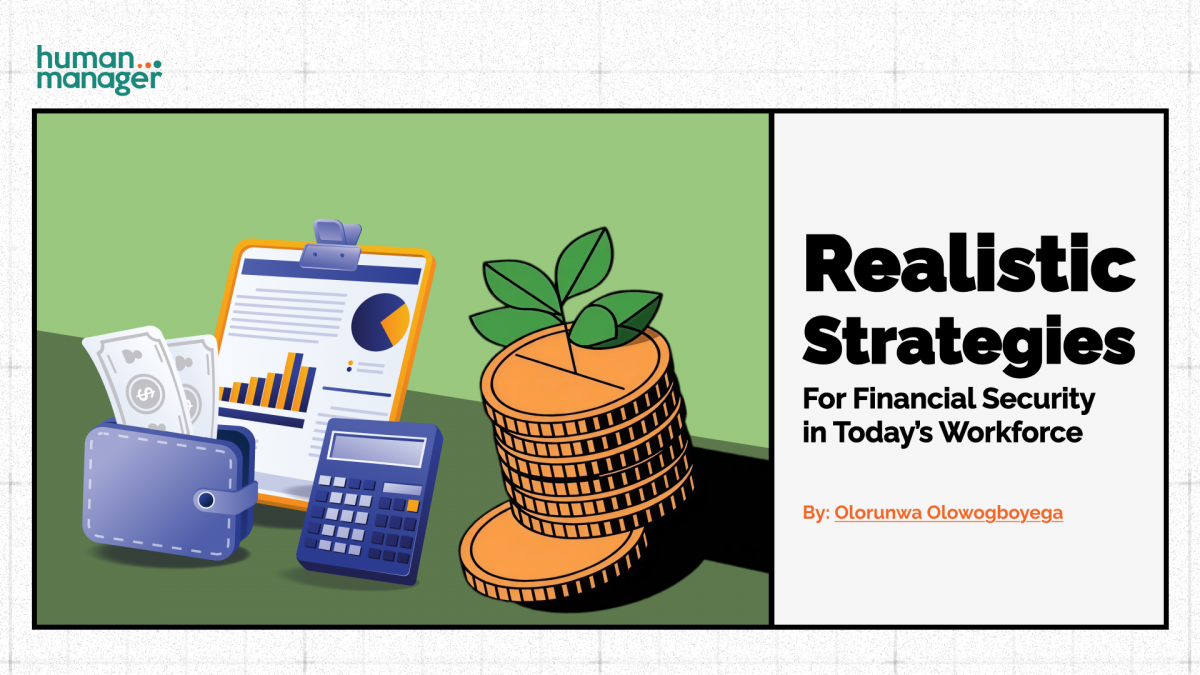By Olorunwa Olowogboyega
Financial security isn’t just a personal win; it’s a business advantage. When employees feel confident about their money, they’re more focused, more engaged, and more likely to stay.
Yet despite financial security benefits, financial stress is still a daily reality for many. It shows up as burnout, absenteeism, and high turnover. That’s why financial wellness can’t be optional anymore. It’s a smart, strategic move for any forward-thinking organisation.
Why Employers Should Support Financial Security
Progressive organisations are beginning to treat financial wellness like any other workplace priority. By providing the right tools and support, firms now help employees make better decisions about saving, budgeting, and long-term planning. This support doesn’t just benefit the workforce; it protects the company’s bottom line.
The HRTech Advantage: Turning Data into Stability
HRTech tools like HumanManager supports financial well-being in a practical, data-driven way. Through full payroll transparency, employees can clearly see their earnings, deductions, benefits, and entitlements.
When employees understand their compensation clearly, they can budget better, avoid unnecessary borrowing, and set savings goals with confidence. For managers, HumanManager provides insights into financial behaviour, a useful data for tailoring support programs or benefits packages that meet real needs.
Want to see how thoughtful UX design in business tools can drive results?
READ MORE: Check out how user experience can directly impact revenue and growth.
Here Are Realistic Strategies
Financial security isn’t built overnight, but consistent steps make a difference. Here’s a streamlined approach for individuals at any level:
A. Daily Strategies:
1. Avoid lifestyle inflation: As your income increases, avoid the temptation to inflate your lifestyle by spending more on luxuries.
2. Prioritise needs over wants: Distinguish between essential expenses and discretionary spending to ensure you’re allocating your resources effectively.
3. Stay informed and educated: Continuously learn about personal finance, investing, and wealth-building strategies to make informed decisions.
4. Avoid unnecessary fees: Be mindful of fees associated with financial products and services and opt for low-cost alternatives whenever possible.
B. Short-Term Strategies (0-5 years)
1. Create a budget and track expenses: Track income and expenses to understand where your money is going.
2. Build an emergency fund: Save 3-6 months’ worth of living expenses in a readily accessible savings account. Cooperative societies within organisations are good grounds to build a saving culture; an application like the HumanManager Payroll management module can handle the deductions from source.
3. Pay off high-interest debt: Focus on eliminating high-interest debt such as credit card balances and ensure competitive rates whenever the needs arise to free up more money for savings and investments.
C. Mid-Term Strategies (5-15 years)
1. Invest in a diversified portfolio: Allocate your investments across different asset classes, such as stocks, bonds, and real estate, to minimise risk.
2. Develop multiple income streams: Diversify your income sources to reduce dependence on a single job or income source.
3. Build a side hustle or freelance career: Develop valuable skills or expertise to create additional income opportunities.
4. Invest in yourself: Continuously update your skills and knowledge to stay relevant on your job.
D. Long-Term Strategies (15+ years)
1. Consider investing in real estate, cryptocurrencies, or other alternative assets to diversify your portfolio.
2. Create a sustainable withdrawal strategy: Develop a plan for withdrawing funds from your retirement accounts to ensure a steady income stream.
3. Review and adjust your financial plan regularly: Periodically assess your financial progress and adjust your plan as needed to stay on track.
Financial security is a collective responsibility. While individuals must take proactive steps, employers play a crucial role in fostering an environment conducive to financial well-being.
By leveraging effective policies on benefits which can be implemented and automatically managed, and committing to sound financial practices, both employees and employers can reap significant benefits.
Because we don’t just build HR software. We build people. Learn more about our services at www.humanmanager.net
Also keep the momentum going and join our community – The HR Growth Circle
